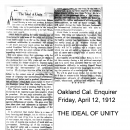Main menu
- ‘Abdu’l-Bahá’s Journey
- World Peace
- Stopping Racism in America
- Empowerment of Women
- More Principles...
- Prayer for America
The Ideal of Unity
ACCORDING to the Persian-American Educational Society a new and modern Rubaiyat has come out of Persia and its chief author, ‘Abdu’l-Bahá, who is to participate in the second annual conference of the society, is to visit Washington next month.
‘Abdu’l-Bahá is coming for many reasons, one of them being to take some of the wind out of President Taft’s sails in so far as the theory of international arbitration is concerned. Of course we all know just how much praise has been accorded President Taft for having started a heart-to-heart talk with the great nations of the world regarding world-wide arbitration.
But now comes along that personage with the Persian name and a silky, flowing set of whiskers who declares that over fifty years ago one of the chief lessons his father sought to impress upon his followers was the necessity for world peace through the instrumentality of arbitration treaties. He develops this idea given him by his father to the extent even of providing for the terms of a treaty for international arbitration, international police and a gradual disarmament. But of course ‘Abdu’l-Bahá must expect to read in the Standpat press that the visitor from Persia is a prevaricator and is stealing Taft’s thunder.
This Persian teacher has a great, big job on his hands if he expects to put into practice what he preaches. He not only advocates the international arbitration idea, but also advocates the blending of the world’s religions, protesting against differences of creeds. He goes even further than that and advocates a universal language and a recognition of the equality of the sexes.
It is admitted that ‘Abdu’l-Bahá is a man of deep learning and thought, but he will be a wonderfully old man if he lives to see the adoption of one tongue, one religion, one line of education, one code of morals, one method of work and one government. Pervading all of his teachings is the ideal of unity and a common world-family. This is beautiful in theory, but altogether too beautiful to work out in practice.
‘Abdu’l-Bahá who, by the way, is the son of Bahá’u’lláh, is to be well received in America, being already on his way from Persia. He is to visit all of the principal cities of the country, making addresses not only before the Bahá’í assemblies, but before audiences of all cults and all denominations, as well as many colleges. He will speak during the Lake Mohunk Conference on International Arbitration and will also be heard at Stanford University.
‘Abdu’l-Bahá is several centuries ahead of the times. His ideas are admittedly beautiful. The keynote of the utterances of the Persian who for half a century has been known to the East, but rarely heard of in Western Europe or America, is unity and universalism. But the difficulty will be in pointing out a religion upon which we can all agree, a language which will suit all races and a single code of morals which will be acceptable.
And besides all of that ‘Abdu’l-Bahá is due to hit this country during a hot political campaign and it is more than probable that he will have considerable difficulty in making himself heard even though he uses several languages in preaching the practice of a one-language race.
We will be glad to see ‘Abdul, but we feel that he is due to return to his Persian home a deeply disappointed advocate of advanced social, economic, educational, political and religious ideas.









